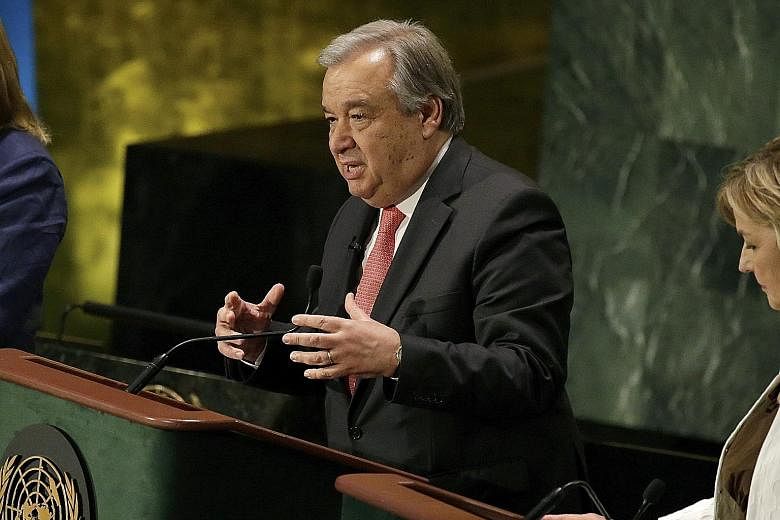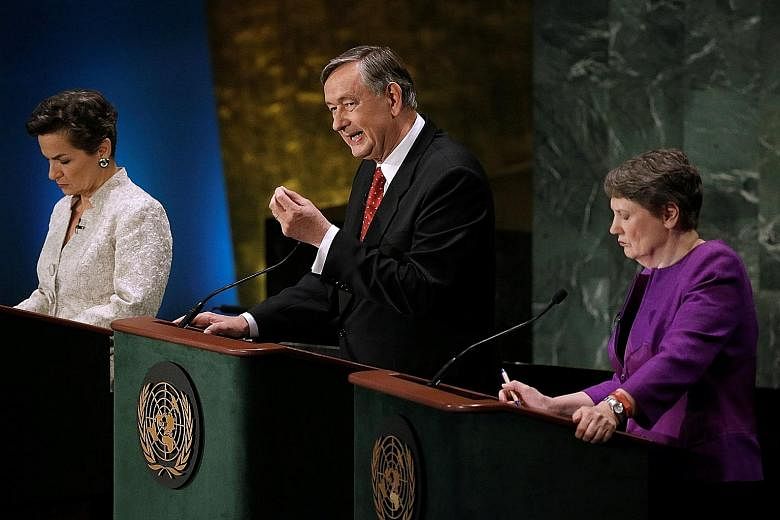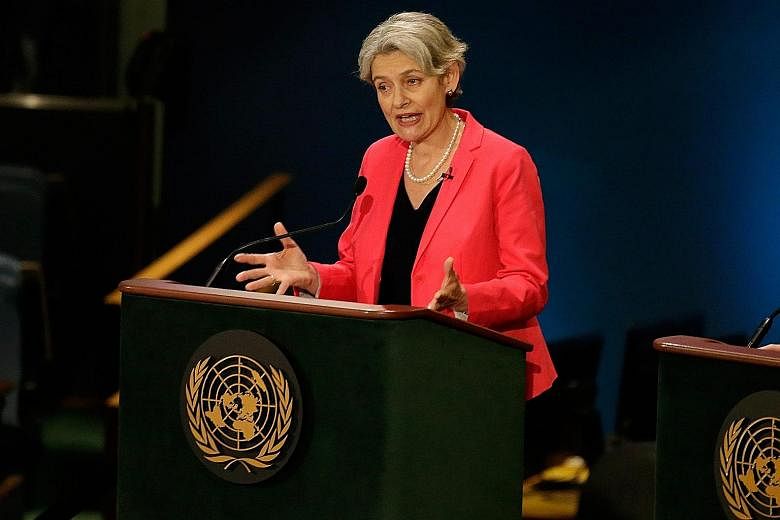NEW YORK • The race for the next United Nations secretary-general has been marked by two things: a clamour for a woman to finally take the helm after 70 years of male leadership, and a push for more light to be shed on the mysterious process by which the Security Council makes its selection.
On Thursday, two things became clear for the six men and six women vying for the post.
First, two men - Dr Antonio Guterres, the former prime minister of Portugal, and Mr Danilo Turk, the former president of Slovenia - got the most votes in a secret Security Council straw poll, with a woman, Bulgarian diplomat Irina Bokova, who is the head of UN cultural agency Unesco, close on their heels.
Second, despite all the agitation for transparency, secrecy still prevails in the council chambers. Diplomats emerged from the nearly two-hour voting session with lips sealed about whom they had given a thumbs up or thumbs down.
Even the candidates, who were told the results, were instructed not to reveal them. It was like the diplomatic version of the conclave of cardinals to select a pope.
No matter. Within a few hours, news trickled out, which led General Assembly president Mogens Lykketoft to wonder aloud why the council did not just make the results of the process public.
"They act as if it's secret," said Mr Lykketoft, a champion of greater transparency. "We all know the figures from the media."
-
How the selection process works
-
UNITED NATIONS • Ahead of the confidential poll, the 193-member United Nations General Assembly has held informal public dialogues with every candidate, during which they were asked to submit their resumes and answer questions from UN member states as well as civil society.
Ultimately, however, it is the 15-member Security Council that will choose a candidate to recommend to the assembly for election later this year.
Under the UN Charter, the Secretary-General shall be appointed by the General Assembly upon the recommendation of the Security Council.
The five nations that hold a veto on the Security Council - the United States, Britain, France, Russia and China - have to agree on a candidate and there is no requirement for them to pay attention to the popularity of candidates.
Before the final decision, several rounds of straw polls will be held among the 15 Security Council members. On Thursday, they were given a ballot for each candidate, with the options of "encourage", "discourage" and "no opinion".
The nominating states will be told of the results for their candidate, but overall results will not be made public.
After the secret balloting, Japan's Ambassador Koro Bessho, also the Security Council president for this month, said "the candidates will be informed of the results through the respective permanent representatives of nominating member states".
The council hopes to agree on a candidate by October, diplomats said.
REUTERS, XINHUA
By the close of business on Thursday his office had not received official results, so Mr Lykketoft took to Twitter to urge the council to share them. The 1 for 7 Billion campaign, a civil society coalition agitating for an open process for the past 18 months, echoed the call, pressing the council to "a continued commitment to a transparent process".
The spread among the candidates was large, with Dr Guterres, a physicist by training and a veteran politician, receiving 12 positive votes out of the possible 15. Mr Turk received nearly as many positive votes, but also two negative votes.
In the next level of front runners were Ms Bokova and two former foreign ministers, Mr Vuk Jeremic of Serbia and Mr Srgjan Kerim of Macedonia. Below them, several candidates received a mix of votes. They included New Zealand's former prime minister Helen Clark, now head of the UN Development Programme, and Ms Susana Malcorra, the Foreign Minister of Argentina, who was until recently also the chief of staff of the incumbent UN chief Ban Ki Moon.
Costa Rican diplomat Christiana Figueres, who headed the UN climate negotiations, came in last with only two positive votes, according to diplomats who spoke on the condition of anonymity.
The race could not come at a more critical time, with eroding public confidence in institutions. This year, for the first time in the UN's 70-year history, all 12 candidates have had to explain, publicly, their background and how they propose to repair a world in tatters.
The choice, ultimately, is likely to be made by the United States and Russia, each of which can veto any candidate. The gulf between the two countries is arguably bigger than in many years, which could make it harder for them to agree on a consensus candidate.
Russia has said it is time for someone from Eastern Europe to have the job while the US has said it would like to see a strong secretary- general, and it is widely understood it would prefer someone who will not buck its national interests.
The straw poll made no distinction between how the council's five permanent members - Britain, China, France, Russia, and the US - voted, versus the 10 other members.
Mr Ban's term expires at the end of the year.
NEW YORK TIMES



